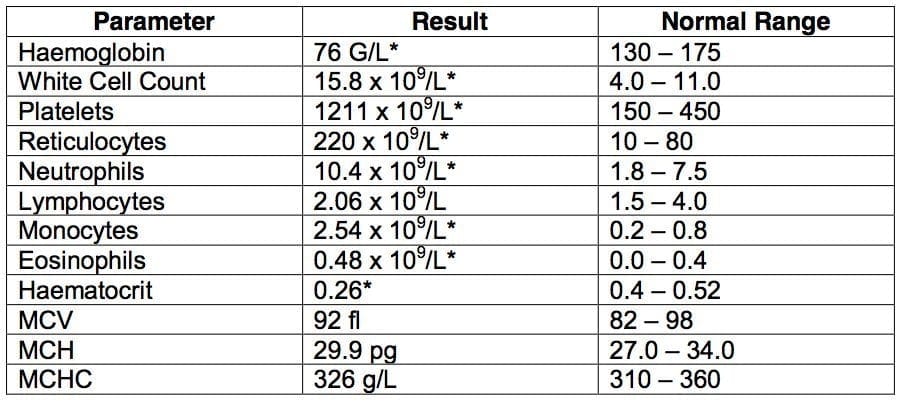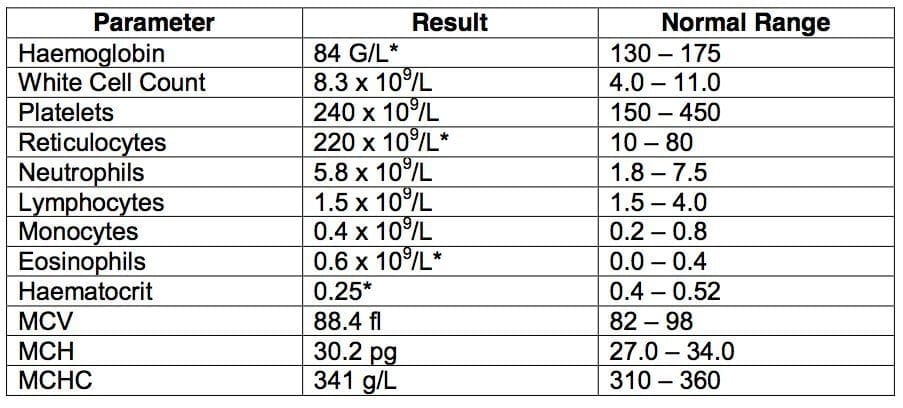CICM SAQ 2012.2 Q12
Questions
Q1. The following is the haemtological profile of a 22-year-old previously healthy female admitted to ICU with community acquired pneumonia:
- a) What is the likely explanation for the APTT result? Give the reasons for your response.
- b) What further test would you order to confirm the underlying disorder?
- c) Give two potential complications of which this patient is at risk
Q2. A 72-year-old man is admitted to ICU post-operatively for multi-trauma following a motor vehicle crash. 10 days post admission he develops a new fever. Septic screen results are pending and the full blood count is as follows:
Comment on blood film: Moderate anisocytosis. Moderate polychromasia. Moderate number of target cells. Occasional Howell-Jolly bodies. Increased rouleaux formation. Marked thrombocytosis.
- a) What is the explanation for this blood picture?
- b) What treatment will you consider to prevent complications of this condition when this man is discharged from hospital?
Q3. The following is the full blood count of a 66-year-old man admitted to the High Dependency Unit following a gastro-intestinal haemorrhage:
- What is the most likely cause of this haematological profile?
Answers
Answer and interpretation
Q1. a) What is the likely explanation for the APTT result? Give the reasons for your response.
- Antiphospholipid antibody syndrome
Q1. b) What further test would you order to confirm the underlying disorder?
- Lupus anticoagulant / Antiphopholipid antibody
Q1. c) Give two potential complications of which this patient is at risk
- Recurrent DVT / PE
- Arterial thrombosis
- Recurrent miscarriage
Q2. a) What is the explanation for this blood picture?
- Post splenectomy
Q2. b) What treatment will you consider to prevent complications of this condition when this man is discharged from hospital?
- Antibiotic prophylaxis with Penicillin or equivalent
- Immunisation prior to hospital discharge for Haemophilus, Meningococcus and Pneumococcus
Q3. What is the most likely cause of this haematological profile?
- Acute blood loss

Examination Library
CICM
Chris is an Intensivist and ECMO specialist at The Alfred ICU, where he is Deputy Director (Education). He is a Clinical Adjunct Associate Professor at Monash University, the Lead for the Clinician Educator Incubator programme, and a CICM First Part Examiner.
He is an internationally recognised Clinician Educator with a passion for helping clinicians learn and for improving the clinical performance of individuals and collectives. He was one of the founders of the FOAM movement (Free Open-Access Medical education) has been recognised for his contributions to education with awards from ANZICS, ANZAHPE, and ACEM.
His one great achievement is being the father of three amazing children.
On Bluesky, he is @precordialthump.bsky.social and on the site that Elon has screwed up, he is @precordialthump.
| INTENSIVE | RAGE | Resuscitology | SMACC



